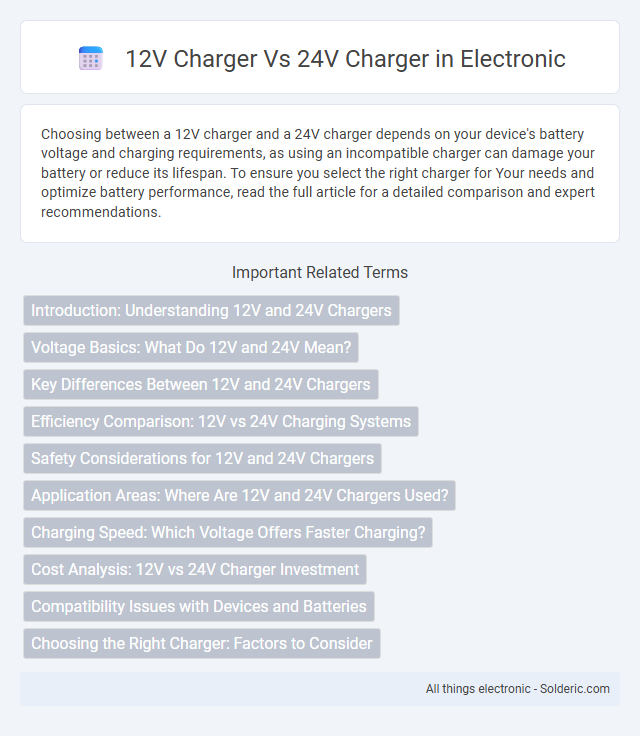Choosing between a 12V charger and a 24V charger depends on your device's battery voltage and charging requirements, as using an incompatible charger can damage your battery or reduce its lifespan. To ensure you select the right charger for Your needs and optimize battery performance, read the full article for a detailed comparison and expert recommendations.
Comparison Table
| Feature | 12V Charger | 24V Charger |
|---|---|---|
| Voltage Output | 12 Volts DC | 24 Volts DC |
| Application | Small devices, automotive batteries, motorcycles | Heavy machinery, industrial batteries, large vehicles |
| Charging Speed | Typically slower for larger batteries | Faster for high-capacity batteries |
| Compatibility | Designed for 12V battery systems | Designed for 24V battery systems |
| Size & Weight | Compact and lightweight | Larger and heavier |
| Cost | Generally lower price | Typically higher price |
| Use Case | Home, automotive, portable devices | Industrial, commercial, heavy-duty vehicles |
Introduction: Understanding 12V and 24V Chargers
A 12V charger is designed to power devices or batteries operating on a 12-volt electrical system, commonly found in smaller vehicles and consumer electronics. In contrast, a 24V charger supports systems requiring 24 volts, often used in heavy-duty vehicles and industrial equipment, providing faster charging and higher power output. Choosing the appropriate charger ensures optimal performance and longevity of Your batteries by matching the voltage requirements precisely.
Voltage Basics: What Do 12V and 24V Mean?
Voltage refers to the electrical potential difference that drives current through a circuit. A 12V charger supplies 12 volts of electrical potential, commonly used for small-scale electronics and automotive batteries, while a 24V charger delivers 24 volts, often required for larger systems like industrial equipment and electric vehicles. The higher voltage of a 24V charger allows for more efficient power transfer over longer distances and supports devices needing greater power input.
Key Differences Between 12V and 24V Chargers
12V chargers are typically used for lighter applications like charging car batteries or small electronics, while 24V chargers are designed for heavier-duty systems such as larger vehicles or industrial equipment. The key differences include voltage output, charging speed, and compatibility with battery systems, where 24V chargers provide faster charging for larger battery banks but require compatible 24V batteries. Your choice between a 12V and 24V charger depends on the voltage requirements of your battery system and the intended charging efficiency.
Efficiency Comparison: 12V vs 24V Charging Systems
24V charging systems generally offer higher efficiency than 12V chargers due to lower current flow, which reduces energy loss from heat dissipation in cables and connectors. Your choice between 12V and 24V chargers impacts overall system performance, especially in applications with higher power demands or longer cable runs. Optimizing for a 24V setup can lead to improved energy efficiency and extended battery life compared to conventional 12V charging systems.
Safety Considerations for 12V and 24V Chargers
Safety considerations for 12V and 24V chargers differ primarily in voltage-related risks and compatibility with devices. A 12V charger presents lower electrical shock risk and is generally safer for smaller battery systems, while a 24V charger requires more robust insulation and protective measures to prevent overheating or short circuits. Ensuring proper voltage matching, using certified chargers, and integrating overcurrent and surge protection devices are critical for both 12V and 24V charging systems to prevent potential hazards.
Application Areas: Where Are 12V and 24V Chargers Used?
12V chargers are commonly used in automotive applications, powering devices such as car batteries, motorcycles, and portable electronics due to their compatibility with standard vehicle electrical systems. 24V chargers find their primary application in heavy-duty vehicles, industrial equipment, and larger battery systems, providing efficient charging for trucks, construction machinery, and some renewable energy setups. Your choice between a 12V and 24V charger depends on the voltage requirements of the equipment or vehicle to ensure optimal charging performance and safety.
Charging Speed: Which Voltage Offers Faster Charging?
A 24V charger typically offers faster charging speeds compared to a 12V charger due to its ability to deliver higher voltage, which reduces charging time for compatible batteries. Higher voltage chargers can transfer energy more efficiently, especially for larger battery packs commonly found in electric vehicles and industrial equipment. Choosing a 24V charger can significantly improve charging efficiency and reduce downtime for users with compatible systems.
Cost Analysis: 12V vs 24V Charger Investment
Choosing between a 12V charger and a 24V charger depends heavily on your budget and power requirements. A 12V charger generally costs less upfront and suits smaller, less demanding battery systems, while a 24V charger involves a higher initial investment but supports more powerful, efficient charging for larger battery banks. Your decision should weigh the balance between cost efficiency and long-term energy needs for optimal value.
Compatibility Issues with Devices and Batteries
12V chargers are designed for devices and batteries rated at 12 volts, while 24V chargers suit those requiring double the voltage, making them incompatible with each other's systems. Using a 12V charger on a 24V battery often results in insufficient charging and potential battery damage, whereas a 24V charger may overcharge and harm a 12V battery. Ensuring your charger matches the voltage specifications of your device or battery is critical to maintain optimal performance and avoid safety hazards.
Choosing the Right Charger: Factors to Consider
Choosing the right charger depends on your battery voltage requirements, with 12V chargers designed for smaller systems and 24V chargers suited for larger or more power-intensive applications. Consider your device's voltage specifications, charging speed, and compatibility to prevent damage and ensure efficient charging. Your choice impacts battery lifespan and performance, so selecting a charger that matches your battery's voltage is crucial.
12V charger vs 24V charger Infographic

 solderic.com
solderic.com